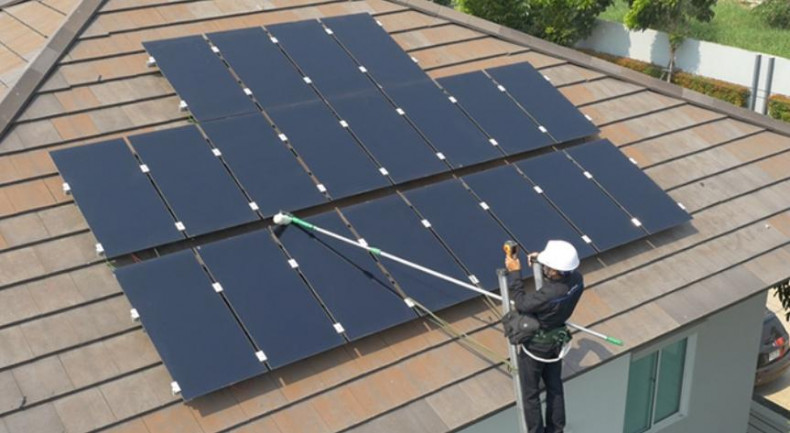 Sena Deveopment zeroes in on solar panel installation
Sena Deveopment zeroes in on solar panel installation
Sena Development has already installed over 1,000 solar panels for its own housing projects.
Sena Development Plc will continue to focus on rooftop solar panel installation to support its goal of becoming a zero-energy house (ZEH) developer.
Solar power is an essential part of ZEH development, utilising proper insulation and built using superior building systems. It is so energy-efficient that it generates as much renewable energy as it consumes, resulting in a net-zero energy bill for occupants.
The company teamed up with Hankyu Hansin Properties Corp, an Osaka-based real estate developer, Chulalongkorn University’s Faculty of Engineering and Panasonic Corporation to build pilot energy efficient houses at Sena Grand Home Bangna in Samut Prakan’s Bang Bo district.
These houses can save 38% of energy on average, said Kessara Thanyalakpark, chief executive of Sena Development.
Its work on energy conservation under this pilot project will pave the way for the development of ZEH.
“We want to take a step forward to build ZEH, but its construction requires a huge amount of money so it may not be affordable for buyers,” said Mrs Kessara.
“We need to keep on conducting R&D, especially in areas related to affordability.”
ZEH needs to be equipped with an energy storage system, but this type of battery is very expensive, driving up the house price.
Mrs Kessara expects battery prices to fall in the future.
Sena Development recently worked with Japanese experts to conduct a field trial of perovskite solar cells (PSCs) which can be developed into a low-cost solar panel cheaper than a conventional silicon-based solar panel.
The name “perovskite” is derived from the nickname of their crystal structure, according to the US Solar Energy Technologies Office.
PSCs can be bent and are able to generate electricity from fluorescent lights, said Mrs Kessara.
“If the field trial is successful, leading to the commercialisation of PSCs, solar cells will no longer be restricted to converting only sunlight into electricity,” she said.
The development of solar cells that can generate power from indoor fluorescent lights is one of the most challenging tasks for smart housing developers, said Mrs Kessara.
Sena Development has so far installed more than 1,000 solar panels for its own housing projects and provided a service to install 1,800 rooftop solar panels for other projects.
The company also operates two solar farms in Saraburi and Nakhon Pathom, with a combined power generation capacity of 46.5 megawatts.
Source: https://www.bangkokpost.com/business/general/2827068/sena-zeroes-in-on-solar-panel-installation


